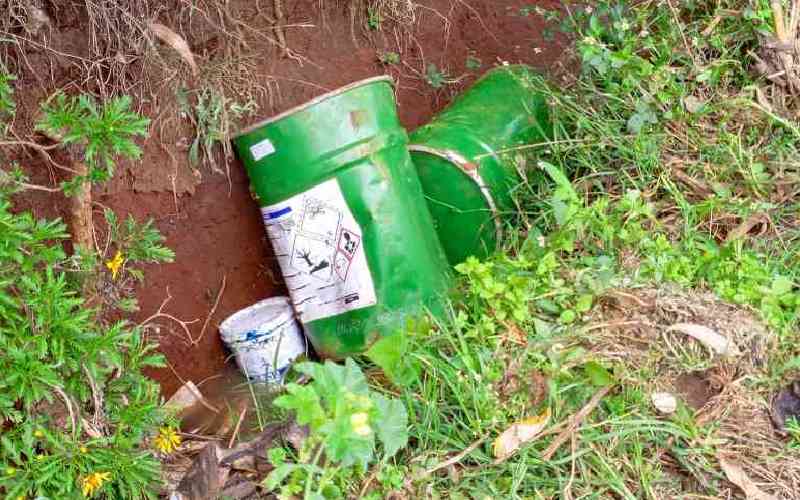
A road accident in Kiambu County has rapidly escalated into a potential public health disaster with far-reaching consequences.
On Saturday, a truck ferrying 22 tonnes of sodium cyanide en route to Uganda overturned, spilling its lethal cargo in Kambembe, Rironi.
In the chaotic aftermath, residents, unaware of the extreme danger, descended upon the scene and began looting the scattered containers.
Days after the incident, an invisible cloud of danger hangs over the area as authorities scramble to recover the stolen material and prevent a widespread poisoning event.
The Ministry of Health (MoH) and the National Environment Management Authority (Nema) have appealed to locals to return stolen containers.
Public Health Principal Secretary Mary Muthoni emphasized the gravity of the situation.
"The ministry advises the public to avoid the site of the incident and to cooperate with our emergency and disaster response teams as they work to contain the situation," she said adding that, the substance is extremely toxic, with ingestion or inhalation of even small amounts potentially fatal.
Nema said several containers have since been reported missing.
"The public is cautioned that the contents of the containers are extremely harmful and should immediately report to the nearest police station or Chiefs' office if they spot the containers," Nema warned.
Kiambu Governor Kiamani Wa Matangi has appealed to locals to take extra caution saying the rains that pounded the area after the accident could have moved the poisonous substance into residential areas.
“Following the incident, Ministry of Health officials, personnel from the Kimabu county government and the police promptly secured the scene. However, subsequent rainfall has raised concerns about potential contamination spreading through rainwater into residential areas. Of even greater concern, 20 drums of sodium cyanide were reported stolen in the aftermath of the accident,” Wamatangi said
He warned that sodium cyanide is an extremely harzardous material that must be handled by experts and urged the people who stole the containers to return them as a matter of urgency.
“We wish to inform the public about the risks associated with sodium cyanide and urge immediate caution, sodium cyanide is extremely hazardous if touched, inhaled or ingested. It poses serious health risks, including difficulty in breathing, rapid breathing, headache, dizziness, vomiting and loss of consciousness and even death. We therefore appeal to anyone who came into contact with the poisonous substance to seek medical attention immediately,” he said.
Wamatangi further urged all residents in the vicinity to remain vigilant and report any suspicious containers or signs of contamination to the authorities.
“We also urgently appeal to anyone who may have come into possession of these drums to bring them to the Rironi Chief’s Camp or the nearest police station immediately. Handling these drums without proper precautions is dangerous and can lead to severe health consequences and environmental contamination,” he said.
The governor said that eight containers of sodium cyanide have already been recovered by the Kiambu response team and contacts have been listed for monitoring and support while public education campaigns are ongoing to raise awareness about the risks associated with sodium cyanide.
“To incentivise the safe return of the chemical, the transporter has pledged a reward for the surrender of the missing containers, meanwhile environmental surveillance is being conducted to assess the extent of contamination,” Wamatangi said.
He said that the search of the missing 12 containers was underway.
“We are collaborating with the media for broader dissemination of safety information and sensitisation as encourage individuals showing symptoms of sodium cyanide poisoning to seek urgent medical assistance the safety and well-being of our people remain our top priority, we urge everyone to cooperate fully with authorities and report any information that may assist in the safe recovery of the missing sodium cyanide containers,” Wamatangi said
Sodium cyanide appears deceptively harmless – a white, crystalline solid that could easily be mistaken for salt or sugar.
However, this chemical harbors a deadly secret. When exposed to water or mild acid, it releases hydrogen cyanide gas, an invisible and rapidly-acting poison.
The World Health Organisation (WHO) classifies cyanide as one of the most hazardous chemical threats to public health and the environment, estimating it causes around 2,000 deaths globally each year – a figure that may be significantly underreported.
Dr Ezekiel Mecha, a Senior Lecturer in the Department of Biochemistry at the University of Nairobi and certified Global Consultant in Biorisk Management and Biosecurity, highlighted the terrifying progression of cyanide poisoning.
"Cyanide causes very severe headache, dizziness, constriction of the airways leading to increased breathing, vomiting, convulsions, seizures, and it's fatal," he said.
Dr Mecha warned that sodium cyanide can be absorbed through the skin and that even mild exposure can cause a range of alarming symptoms.
The danger extends beyond immediate poisoning. Long-term studies of cyanide exposure survivors have revealed persistent neurological issues, including memory problems, difficulty with fine motor skills, Parkinson's-like symptoms, and increased rates of anxiety and depression.
These lasting effects are thought to stem from hypoxic brain injury caused by the initial poisoning event.
Environmental contamination poses another critical concern. Dr Mecha says, sodium cyanide can persist in soil and water, threatening ecosystems and potentially entering the food chain.
The incident in Kiambu County is not without precedent. Cyanide-related accidents have occurred worldwide, often with catastrophic results.
In 2000, a gold mine spill in Romania released 100,000 cubic meters of cyanide-contaminated water into the Danube River, causing extensive environmental damage across multiple countries.
More recently, a 2015 warehouse explosion in Tianjin, China, released significant amounts of sodium cyanide, contributing to 173 deaths and widespread contamination.
As local hospitals brace for potential poisoning cases, the incident underscores the critical need for public education on chemical hazards and proper emergency response protocols.
The Centers for Disease Control and Prevention (CDC) warns that cyanide can enter the body through inhalation, ingestion, or skin absorption, launching a swift and devastating attack on the body's cells by inhibiting crucial enzymes involved in cellular respiration.
Authorities face the daunting task of locating and securing the looted sodium cyanide containers while simultaneously preparing for possible poisoning cases.
 The Standard Group Plc is a multi-media organization with investments in media platforms spanning newspaper print
operations, television, radio broadcasting, digital and online services. The Standard Group is recognized as a
leading multi-media house in Kenya with a key influence in matters of national and international interest.
The Standard Group Plc is a multi-media organization with investments in media platforms spanning newspaper print
operations, television, radio broadcasting, digital and online services. The Standard Group is recognized as a
leading multi-media house in Kenya with a key influence in matters of national and international interest.











